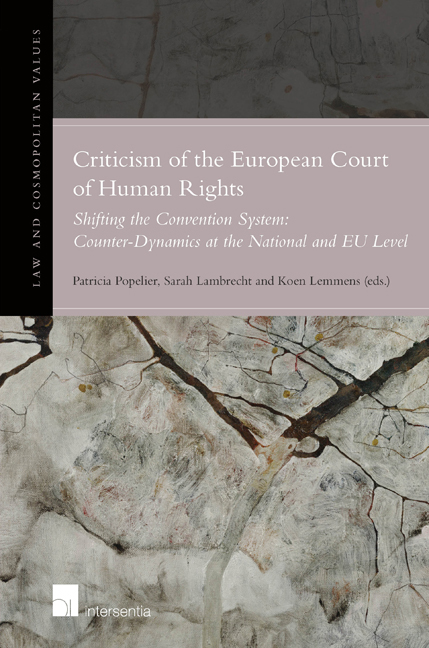 Criticism of the European Court of Human Rights
Criticism of the European Court of Human Rights from PART III - MODERATE CRITICISM
Published online by Cambridge University Press: 13 December 2017
CRITICISM OF THE EUROPEAN COURT OF HUMAN RIGHTS
Norwegian criticism on the European Court of Human Rights (the ECtHR or the Court) is strongly connected to the impact of the European Convention on Human Rights (the ECHR or the Convention) in Norwegian law. In particular since around 2000, the impact of the ECHR has grown because of the increased formal status of the ECHR in Norwegian law and the expanding case law and dynamic interpretation of the Court (both in cases against Norway and in cases against other Member States). The increased impact has led to increased criticism of both the ECtHR and the Convention system.
Norway was among the first countries to sign and ratify the ECHR. But even though Norway is considered a fierce supporter of human rights, it was not a fierce supporter of the ECtHR during the drafting of the Convention. Norway argued against the establishment of the ECtHR. And when it became clear that the ECtHR was to be established, Norway was among the countries who argued for granting the ECtHR only weak remedial powers – including no power to invalidate domestic legislation. Norway accepted the jurisdiction of the ECtHR in 1964, but only after considerable debate at the national level.
Norway has a dualistic system. International conventions need an act of implementation to become part of Norwegian law. Such an act can take three forms: Active transformation (the recital method), incorporation (the reference method) and passive transformation (a simple finding of conformity between existing Norwegian law and the international obligations). When the Convention was ratified, a passive transformation was deemed sufficient. Norway perceived itself as a well-functioning and democratic state that would not violate human rights and the Convention was mainly thought to protect against the (re-)establishment of authoritarian and suppressive regimes. Further, the first case in which Norway was found to violate the Convention by the ECtHR only came in 1990. And until then Norwegian courts had only sporadically dealt with the Convention, and mostly as an argument in support of a solution achieved through other sources of law.
To save this book to your Kindle, first ensure [email protected] is added to your Approved Personal Document E-mail List under your Personal Document Settings on the Manage Your Content and Devices page of your Amazon account. Then enter the ‘name’ part of your Kindle email address below. Find out more about saving to your Kindle.
Note you can select to save to either the @free.kindle.com or @kindle.com variations. ‘@free.kindle.com’ emails are free but can only be saved to your device when it is connected to wi-fi. ‘@kindle.com’ emails can be delivered even when you are not connected to wi-fi, but note that service fees apply.
Find out more about the Kindle Personal Document Service.
To save content items to your account, please confirm that you agree to abide by our usage policies. If this is the first time you use this feature, you will be asked to authorise Cambridge Core to connect with your account. Find out more about saving content to Dropbox.
To save content items to your account, please confirm that you agree to abide by our usage policies. If this is the first time you use this feature, you will be asked to authorise Cambridge Core to connect with your account. Find out more about saving content to Google Drive.